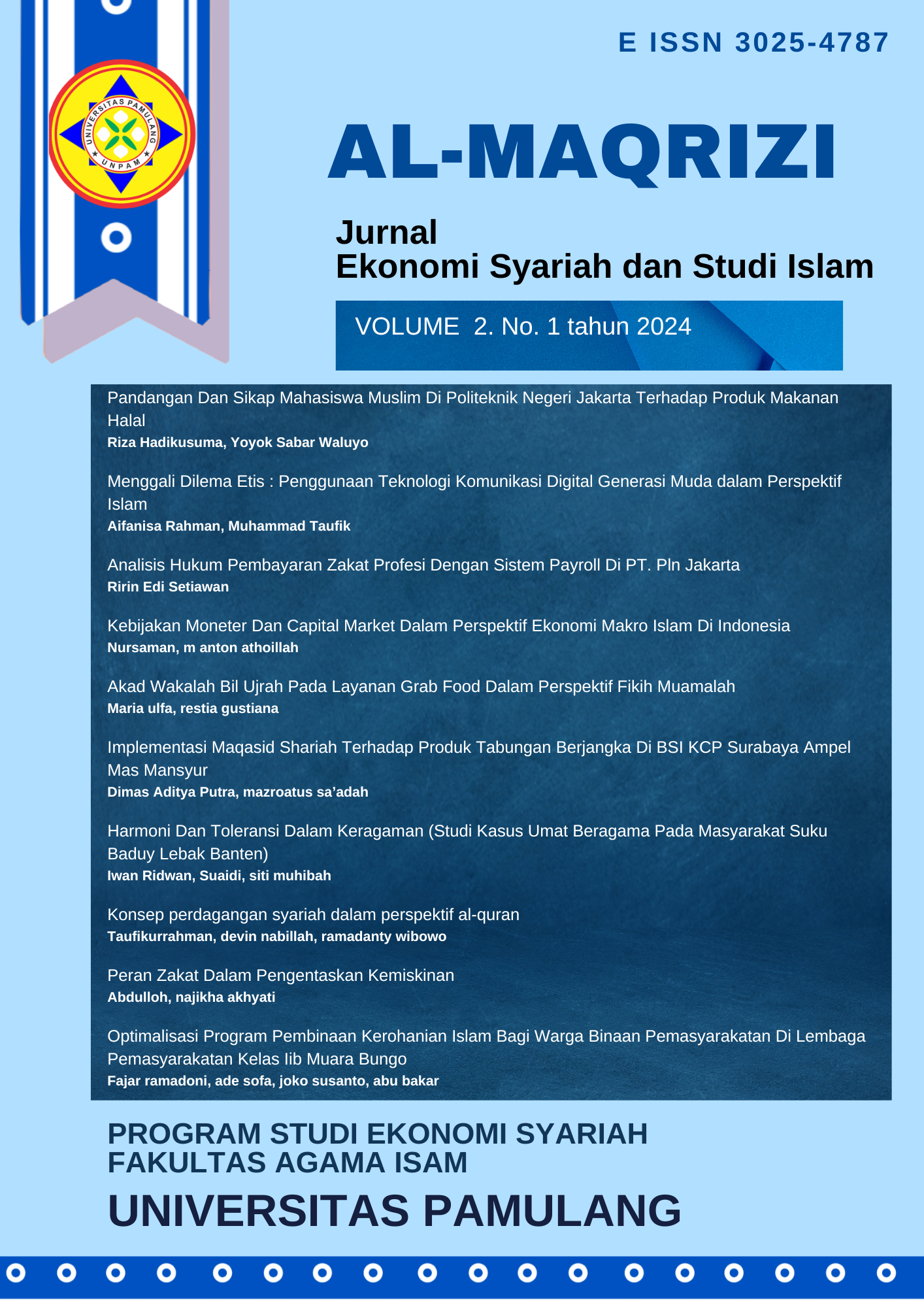Akad Wakalah Bil Ujrah pada Layanan Grab Food dalam Perspektif Fikih Muamalah
Keywords:
Contrack, Wakalah Bil Ujrah, Grab FoodAbstract
Digital developments have a big influence on the pace of the Indonesian economy, transactions can even be used a digital modes such as handphone, from this mode people can use various things, including uploading an application that can be used for various services such as online food delivery orders. One of the online food purchasing service facilities that is familiar to the public is Grab Food. Grab Food, which is made by Grab, Grab Food is leading the food delivery market in Southeast Asia from 2020 to 2022. There is a wakalah bil ujrah contract in this Grab Food service, namely when a customer gives full authority to the driver to represent In terms of buying food products that customers want, one party becomes the representative of another party to carry out an affair or work which in Muamalah Fiqh is known as a wakalah contract. The wakalah bil ujrah contract that occurs on the Grab Food service is in accordance with Islamic law, the wakalah bil ujrah contract on the Grab Food service meets the pillars and requirements of wakalah. From this research it can also be concluded that the practices that occur in the Grab Food service are also in accordance with Muamalah Fiqh.
References
Khoerudin, Koko. (2019). Fikih Muamalah Teori dan Implementasi. Bandung: PT Remaja Rosdakarya
Suqiyah, Musafa’ah. (2020). Tafsir Ayat Hukum Ekonomi dan Bisnis Islam. UIN Sunan Ampel Surabaya.
Abdul, Aziz, dkk. (2020). Akad Wakalah Menjadi Penyebab Pembiayaa Murabahah Bergeser Dari Transaksi Jual Beli Menjadi Transaksi Jasa.
Jurnal Koordinat Vol. XIX No. 2 Tahun 2020, Hal. 233-246 Dewan Syariah Nasional MUI, Akad Wakalah Bil Ujrah.
Ahmed, Rijal. (2022). Akad Wakalah Dalam Jual Beli. Jurnal al-Hiwalah. Vol. 1 No. 1 Tahun 2022, Hal. 1-17.
Wati, Rahmi. (2018). Diktat Akad Dalam Hukum Islam. Universitas Lampung.
Hariman, Surya. (2019). Fikih Muamalah (Teori dan Implementasi). Bandung: PT Remaja Rosdakarya.
Rahmat, Hidayat. (2022). Fikih Muamalah (Teori dan Prinsip Hukum Ekonomi Islam). Medan: CV. Tungga Esti.
Abu Azam, Al-Hadi. (2017). Fikih Muamalah Kontemporer. Depok: Rajawali Pers.
Sa’adah, Yuliana, dkk. (2017). Transaksi Ekonomi dan Bisnis. Yogyakarta: Idea Press.
Afrizal. (2005). Pengantar Metode Penelitian Kualitatif: dari Pengertian Sampai Penulisan Laporan, h. 69.
Miles, Mathew B. dan Michel Huberman, (1992). Analisis Data Kualitatif .
Said Atabik, dkk. (2022). Analisis Penerapan Akad Wakalah Bil Ujrah Pada Layanan Go Mart. Jurnal Ilmiah Ekonomi Islam. Vol.8 hal. 3317-3322.
Muhajir. (2023). Analisis Hukum Islam Pada Akad Aplikasi Grab Food. Al-Faruq: Jurnal Hukum Ekonomi Syariah dan Hukum Islam. Vol. 2 no. 1. Hal 14-26.
Ratna Tri Hardaningtyas. (2018). Persepsi Masyarakat Terhadap PenggunaanTransportasi Online (Grab) di Malang. Inobis: Jurnal Inovasi Bisnis dan Manajemen Indonesia. Vol.2 No.1. Hal.42-58.
Muhammad Zidni, Maria Ulfa. Bahasa Arab II, Tangerang Selatan: UNPAM PRESS.


